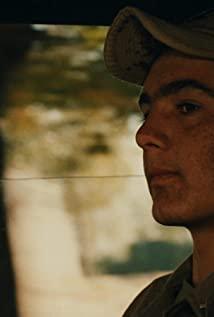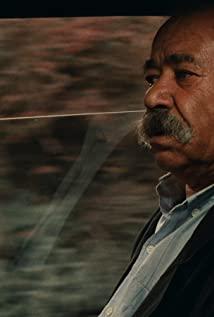In March, the news that "a man brought a shovel to the cemetery to bury himself alive" was bizarre and deeply touching. Perhaps the desperate suicide did not intend to choose such a dramatic farewell, but bystanders It seems that there is no doubt that life will be as absurd as a play. Coincidentally, the movie "The Taste of Cherry" happened to tell such a story - a suicide man drove a car and wandered in the suburbs, looking for someone who could bury himself. The scenes of the film are very monotonous. Most of the shots are shot in the cramped car of Mr. Buddy and the hitchhiker, or the scenery seen from the car window on the way. In fact, the scenery on the road is also extremely boring. Only the loess in the sky and the sand and dust raised by construction vehicles. The small space inside the car and the close-up view give a feeling of depression, while looking out the window, the distant view that should create a feeling of openness is another kind of dullness. In contrast to the unchanging scenery, the sound effects in the movie are loud and rich. The scenes that do not enter the camera are full of children's laughter, workers' construction and conversation, and the roar of vehicles and machines. The sense of space, at the same time, the sounds that represent the dynamic life scenes are also contrasted with the lonely engine sound in Buddy's car: the lively world and the world-weary. Mr. Buddy first asked two workers at the construction site if they would like to work for him for extra income, but he was categorically refused before he could tell the real purpose, and then he made a request to the three hitchhikers to communicate with them. The reaction constitutes the main content of the film, and also reflects the attitudes of different groups of people towards the eternal proposition of "survival and death". Recruits represent common views of people in secular society, seminary students represent theological and religious views, and museum taxidermists represent life interpreted from a philosophical and historical perspective. The recruits made no secret of their instinctive fear and disgust when they learned that they were asked to bury themselves the next morning. Like most people, they could not accept, or even strongly resist, this life-ending behavior, except morally. In addition to the limited sympathy and pity they feel, they think more about their own interests than they really care about each other. The reason the soldier refused was "I don't want to be involved in this", which clearly showed his evasive and indifferent attitude towards death. Buddy persuaded him that it was just like a soldier's mission, that he just had to follow orders, but the recruit eventually panicked and fled. In his morals, he can kill survivors on the battlefield, but cannot help those who seek death. It is true that we can all understand this kind of human emotion and helplessness, but it is also a kind of irony, pointing sharply to the distorted justice and morality derived from human society. Virtue, and all this tramples on life. When he asked the seminary students, Buddy was still unsuccessful. The students unconsciously persuaded Buddy's decision for reasons of faith. He hoped to use religious beliefs to make Buddy change his mind, even though his intentions were well-intentioned. , but even to the spectator, those sermons appear pale and hollow. The Seminary's almost reflexive copying of the teachings to carry out their duties contrasts with, but echoes, the Soldier's response. Violent institutions issue orders that cannot be disobeyed, religions try to constrain people's behavior with some dogmatic rules, soldiers carry out orders to kill, priests carry out orders to redeem, they all place their lives in a submissive, irrefutable and irresistible way. It is also a kind of indifference to life, regardless of the real feelings of each individual. With older taxidermists, things are more complicated. On the one hand, he is also a preacher, and almost the most common type in life, babbling about things that people have long known, but it is also acceptable - except for those that everyone knows, we There is no new truth to tell. The theological student speaks the empty words of religion, and the taxidermist speaks the empty words of the world, but the difference is that the taxidermist accepts Buddy's request that he needs a sum of money to heal his sick child. The taxidermist kept telling his personal experience and philosophical stories along the way, hoping that Buddy would change his mind, but he also said that if death did happen, he would do as Buddy asked. This transaction contains interests, and it also shakes Buddy's ideas out of sincere understanding and respect. This journey of preparing to end his life is also a journey of reliving it, and Buddy goes from hesitant and reserved to gradually opening his heart. At first, the lengthy chat with the soldier seemed a little awkward. He asked the soldier's family and financial situation, and wondered whether he would help him for the reward. He only hoped that someone would help him complete this death ceremony, and he did not hope to get the understanding of the other party. . When seminary students get into the car, they can already clear their minds and discuss sin calmly and earnestly. "I know suicide is a very serious sin, but unhappiness is also a very serious sin. When you are unhappy, you will hurt others." "God is exalted, and he cannot force us to survive." Facing seminary students firmly He also does not expect the other party to truly understand his decision. The reason for Buddy's giving up is not mentioned in the film, and his own words to the seminary students express this clearly: "It will not help I don't want to talk about your understanding either." In this sense, the director did not tell the audience about Buddy's pain, but also explained the creator's own point of view: even if Knowing a person's experience, bystanders still can't understand the heart of the person who has experienced it. From this point of view, the taxidermist's words of comforting Buddy cannot be called positive and positive. The conversation between the two is more like lecturing and listening. in silence. "If you don't say it, no one can help you." Even though the old man has experienced the choice and transformation of life and death, his words are still in the tone of an outsider. Some things are unspeakable, or is there really a way to express pain? “Be optimistic and look at the problem positively” is an even more hollow statement than religious requirements. It is undoubtedly a superficial and even unrealistic solution to ask the other person to change their views outside the position of the people at that time. "Say something too, I've said a lot, I've said everything." is a terrifying closing sentence that means, ok, what should be taught has been taught, now it's your turn expressed. But obviously, the purpose of this narrative is not to arouse the disgust of the audience. In the taxidermist's narration, the only touch of warmth is probably the memory of the morning when he decided to commit suicide when he was young, and the sadness left by the taste of cherries. Life is full of tenderness again. On the other hand, his preaching to Buddy wasn't meant to be preaching, it's more likely that we can't find a more effective way to get into another person's heart, and won't give up even if all we can say is platitudes Take a man's chance from the brink. If understood from this perspective, those repugnant sermons appear extremely tragic. Although the words that can be said are only replaced by another empty expression, human beings have never given up communication, understanding, and warmth of each other. effort. We've said all we can, and I'll tell you some of the moments that made me feel good and changed me, want you to discover something as subtle and beautiful as a butterfly flapping its wings, but I'll leave you the choice, if you still Decide to end this pain, then I will help and respect you. Understanding is premised on acknowledging that people do not understand each other, so respect for each choice. At the construction site, Buddy talks to the guards about the land. "Don't you think that dirt is a good thing? The dirt has given us all the good things." "Then all good things will also be returned to the dust." The guard's name is the name of an imam's tomb, symbolizing the Gone and perpetuated. In this loop, Buddy wanders in his car, but when they reach the taxidermist's drop-off point, they finally enter the city from the wilderness, and for the first time cats, green trees and open sunsets appear in the loess-filled scenery. When night fell, Buddy returned as promised On the outskirts, lying in his grave, waiting to die, or waiting for the taxidermist to wake him up with the new dawn. The moon is beautifully lit and dark among the clouds, but the scene I prefer is when he comes to the hillside, and the loess-covered wasteland, which is bland in the daytime, becomes extraordinarily brilliant, from which a whole city of lights can be seen in the distance. . We don't know what will happen tomorrow, but wait a little longer, maybe we will usher in that simple and beautiful moment, like the cherry in the morning, and hope that in the dark night, we can all pick up the firefly-like light. Public account / tone radio
View more about Taste of Cherry reviews











